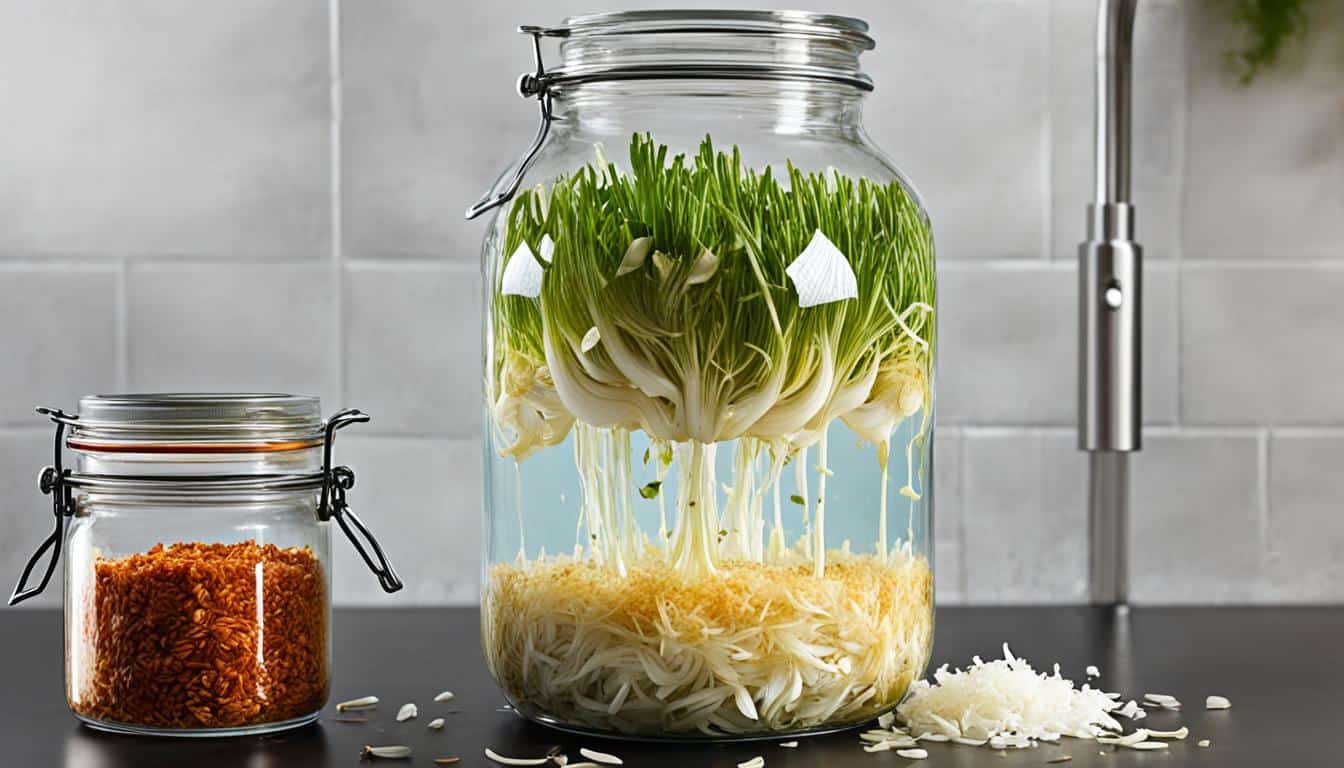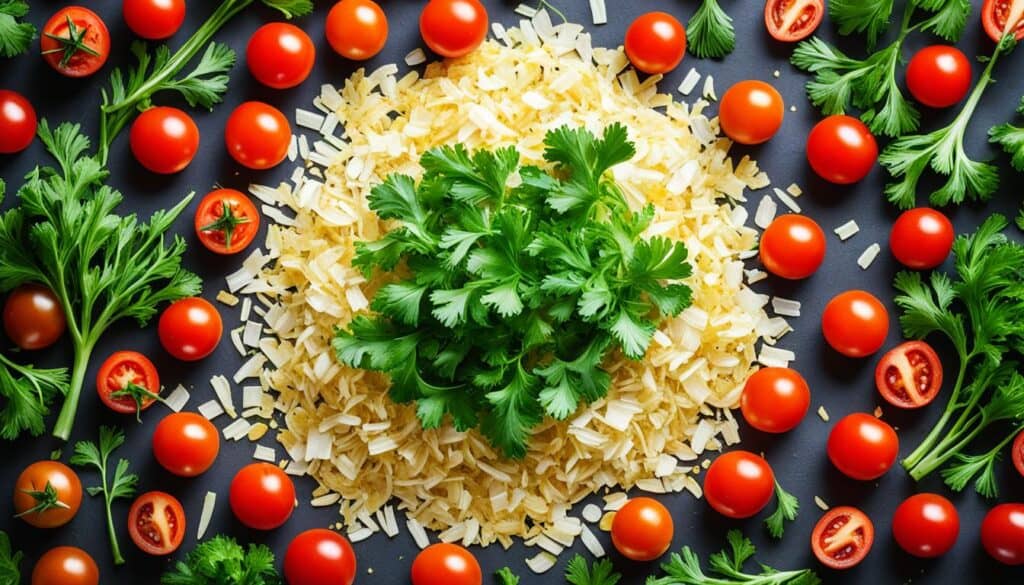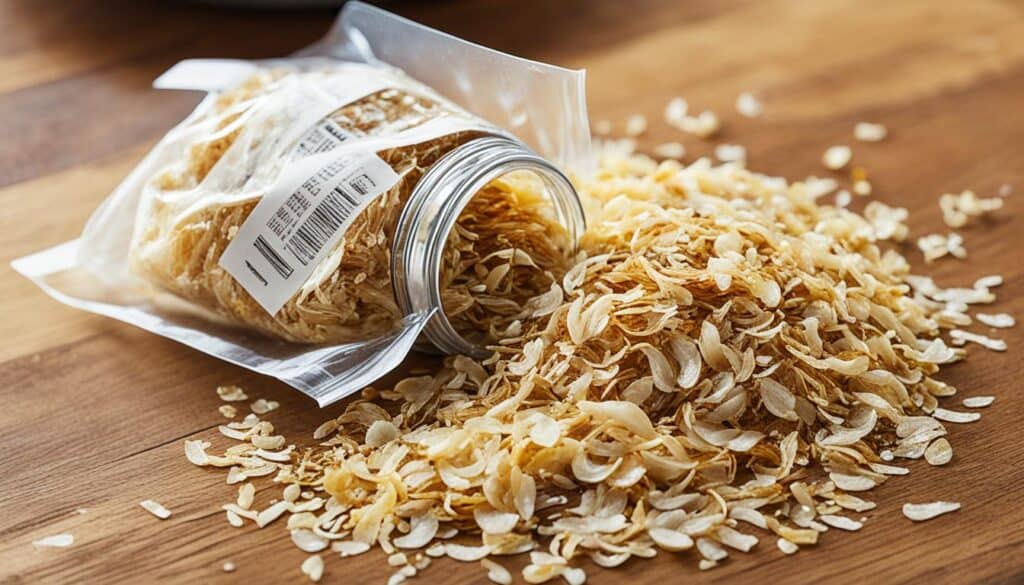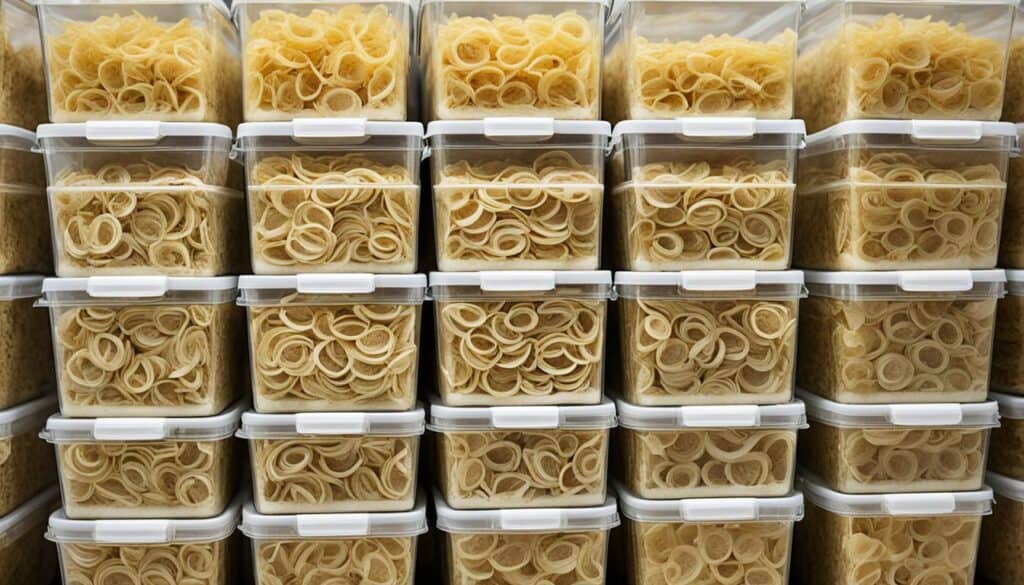Did you know that dehydrated onions have a shelf life of up to two years? That’s right! These versatile pantry staples, also known as dried onion flakes, onion powder, or onion granules, offer a long-lasting solution for adding depth of flavor to your favorite dishes. Whether you’re a busy home cook looking for convenience or a camping enthusiast seeking lightweight ingredients, dehydrated onions are a game-changer for elevating your culinary creations.
Key Takeaways:
- Dehydrated onions have a shelf life of up to two years, making them a long-lasting and convenient pantry staple.
- They come in various forms, such as dried onion flakes, onion powder, and onion granules.
- Dehydrated onions retain the depth of flavor and nutritional value of fresh onions.
- They can be easily rehydrated or directly added to dishes with high liquid content.
- Dehydrated onions are a versatile ingredient that can enhance the flavor profiles of soups, stews, sauces, and more.
What are Dehydrated Onions?
Dehydrated onions are a popular pantry staple that undergo a unique process called freeze-drying. This process involves the removal of moisture while retaining the onions’ natural flavors and nutritional value. The result is a lightweight and crispy product that maintains the shape, texture, and taste of fresh onions. Dehydrated onions are an excellent alternative to their fresh counterparts because they offer convenience, long shelf life, and consistent quality.
During the freeze-drying process, the moisture is carefully removed, leaving behind onions that are lightweight and crispy. This makes dehydrated onions easy to store and use in various dishes. Whether you’re preparing soups, stews, or stir-fries, dehydrated onions can add depth and aroma to your culinary creations.
One of the key advantages of dehydrated onions is their ability to retain their shape and taste even after the moisture removal process. Unlike other onion products, dehydrated onions do not turn mushy when rehydrated or cooked. They maintain their original texture, allowing you to enjoy the distinct crunch and flavor of onions in your dishes.
Additionally, dehydrated onions offer the convenience of being readily available in your pantry whenever you need them. Unlike fresh onions, dehydrated onions do not require peeling, cutting, or chopping. They are a time-saving ingredient that can be easily incorporated into your recipes, providing the delicious taste of onions without the hassle.
If you’re curious to see the process of freeze-drying in action, take a look at the image below:
With their moisture removal technique, dehydrated onions transform into a versatile ingredient that can be used in a variety of dishes. From savory soups and stews to crispy snacks and flavorful marinades, dehydrated onions elevate the taste and aroma of your favorite recipes.
Next, let’s delve into the many benefits that dehydrated onions have to offer. But first, a word from someone in the know:
“Dehydrated onions are truly a game-changer in the kitchen. Not only do they retain their shape and taste, but they also provide the convenience and versatility that every home cook needs. Whether you’re a beginner or an experienced chef, dehydrated onions are a must-have ingredient in your culinary arsenal!”
– Celebrity Chef Sarah Thompson
Benefits of Dehydrated Onions
When it comes to cooking, dehydrated onions offer a variety of benefits that make them a valuable addition to any kitchen pantry.
First and foremost, dehydrated onions have a long shelf life. This means you can stock up on them without worrying about spoilage or waste. Having a supply of dehydrated onions ensures that you always have this versatile ingredient on hand when you need it.
One of the greatest advantages of using dehydrated onions is the convenience they provide. Unlike fresh onions that require peeling, cutting, and chopping, dehydrated onions are ready to use straight out of the package. This saves you time and effort in the kitchen, especially on those busy days when you need a quick and hassle-free cooking solution.
Don’t be fooled by their lightweight appearance. Dehydrated onions may be small, but they pack an intense flavor. Once rehydrated, these onions release their robust taste, adding depth and complexity to your recipes. Whether you’re making soups, stews, sauces, or marinades, dehydrated onions bring a burst of savory goodness to every dish.
“The intense flavor of rehydrated dehydrated onions adds depth and complexity to your favorite recipes.”
One of the key reasons why chefs and home cooks love using dehydrated onions is their versatility. These onions can be used in a wide range of dishes, from classic comfort foods to gourmet creations. Their strong flavor pairs well with meats, vegetables, and grains, making them a go-to ingredient for enhancing the taste and aroma of your culinary masterpieces.
Whether you’re looking to stock up your pantry, save time in the kitchen, or add a punch of intense flavor to your dishes, dehydrated onions are a must-have ingredient. Their long shelf life, convenience, intense flavor, and versatility make them a valuable asset for home cooks and professional chefs alike.
How to Use Dehydrated Onions
Dehydrated onions offer a convenient and versatile way to incorporate the delicious flavor of onions into your dishes. There are two primary methods for using dehydrated onions: rehydration and direct addition. Let’s explore both methods in detail.
Rehydration Method
To rehydrate dehydrated onions:
- Place the desired amount of dehydrated onions in a bowl.
- Add warm water to the bowl, covering the onions completely.
- Allow the onions to soak for a few minutes, until they become plump and tender.
- Drain any excess water from the bowl.
- The rehydrated onions are now ready to be used in your favorite recipe!
Rehydrated dehydrated onions have a texture and taste similar to fresh onions, making them an excellent substitute in recipes that call for onions.
Direct Addition Method
If you’re preparing a dish with a high liquid content, such as soups, sauces, or stews, you can directly add dehydrated onions without the need for rehydration. Here’s how:
- Sprinkle the desired amount of dehydrated onions directly into the dish.
- As the dish cooks, the moisture from the liquid will rehydrate the onions.
- Stir occasionally to distribute the flavor evenly.
- The dehydrated onions will absorb the liquid and become plump and flavorful.
This method saves you time and effort, allowing you to enjoy the convenience of using dehydrated onions in your cooking.
Whether you choose to rehydrate dehydrated onions or directly add them to your dishes, they will infuse your recipes with the unmistakable taste and aroma of onions.
Now that you know how to use dehydrated onions, let’s explore some delicious recipe ideas in the next section.
Recipe Ideas with Dehydrated Onions
Looking for some recipe inspiration using dehydrated onions? There are numerous delicious dishes you can create with this versatile ingredient. Let me share a few mouthwatering ideas to get you started.
Creamy Onion Dip
Indulge in a creamy and flavorful onion dip by combining rehydrated dehydrated onions with tangy sour cream, rich mayonnaise, and a delightful blend of herbs and spices. Serve it with your favorite chips or crackers for a crowd-pleasing appetizer that will be the highlight of any gathering.
Savory Onion Quiche
Elevate your brunch game with a savory onion quiche that is sure to impress. Sprinkle a generous amount of dehydrated onions over a delectable quiche filling, such as crispy bacon and creamy Swiss cheese. Bake it to perfection and savor the irresistible combination of flavors and textures.
Onion-Infused Pasta Sauce
Transform your ordinary pasta sauce into something extraordinary with the addition of rehydrated dehydrated onions. Simply stir them into your favorite simmering sauce and let the rich onion flavor infuse every bite. Whether it’s a classic marinara or a hearty Bolognese, the onions will bring a delicious depth to your pasta dish.
These recipe ideas are just the beginning of the culinary possibilities with dehydrated onions. Get creative, experiment with different flavors, and enjoy the wonderful aromas and tastes that they bring to your meals.
Stay tuned for the next section, where I’ll explore how dehydrated onions can be an essential ingredient for camping and outdoor cooking adventures.
Dehydrated Onions as a Camping Essential
As an outdoor enthusiast, I know the importance of having lightweight and long-lasting food options when camping. That’s why dehydrated onions have become an essential item in my camping provisions. Their versatility and ability to enhance the flavor of any campfire meal make them a must-have for any camping trip.
Dehydrated onions are incredibly lightweight, making them easy to pack and carry. Unlike fresh onions, which can be bulky and prone to bruising, dehydrated onions take up minimal space in your backpack. They also have a long shelf life, so you don’t have to worry about them spoiling during your camping adventures.
When you’re out in the wilderness, every ingredient counts, and dehydrated onions deliver a punch of flavor and depth to your meals. Whether you’re cooking up a hearty stew, a savory breakfast skillet, or a simple foil packet dinner, adding dehydrated onions can take your camping food to the next level. Just a small handful of these dried gems can transform a basic dish into a tasty and satisfying meal.
But it’s not just about the flavor. Dehydrated onions also offer practical benefits when camping. They eliminate the need to chop, slice, or dice fresh onions, saving you time and effort in meal preparation. Plus, they rehydrate quickly, so you can enjoy the full flavor and texture of onions without any hassle.
So, next time you’re planning a camping trip, don’t forget to pack a supply of dehydrated onions. They’re lightweight, have a long shelf life, and will elevate your camping food experience with their rich flavor and convenience.
Nutritional Value of Dehydrated Onions
Dehydrated onions retain most of their original nutritional value, including vitamins, minerals, and antioxidants. These powerhouse ingredients offer a concentrated source of essential nutrients, making them a valuable addition to a well-balanced diet.
When it comes to vitamins, dehydrated onions are particularly rich in vitamin C and vitamin B6. Vitamin C is known for its immune-boosting properties, while vitamin B6 plays a vital role in brain development and function.
In terms of minerals, dehydrated onions are a great source of potassium, which is important for maintaining healthy blood pressure levels. They also contain small amounts of other minerals like calcium, iron, and magnesium, which contribute to various bodily functions.
The Antioxidant Power of Dehydrated Onions
One of the most noteworthy aspects of dehydrated onions is their high antioxidant content. Antioxidants help protect the body from damage caused by free radicals, unstable molecules that can lead to oxidative stress and contribute to chronic diseases.
“Dehydrated onions possess a variety of antioxidants, including quercetin, a potent flavonoid that has been linked to several health benefits.”
Quercetin, found abundantly in onions, has been associated with reducing inflammation, supporting heart health, and even potentially inhibiting the growth of certain cancer cells.
Countless Ways to Boost Nutrition with Dehydrated Onions
With their concentrated nutritional profile, dehydrated onions offer a convenient way to enhance the nutritional value of your meals. Whether you’re incorporating them into soups, stews, casseroles, or salads, dehydrated onions can provide an extra dose of vitamins, minerals, and antioxidants.
Furthermore, due to their long shelf life, dehydrated onions are always at hand, ensuring you have a nutritious ingredient available whenever inspiration strikes in the kitchen.
| Nutrient | Amount per Serving (1/4 cup) |
|---|---|
| Calories | 60 |
| Protein | 2g |
| Total Fat | 0g |
| Carbohydrates | 14g |
| Fiber | 2g |
| Potassium | 240mg |
| Vitamin C | 8% of the Daily Value (DV) |
| Vitamin B6 | 4% of the DV |
Table: The nutritional content of dehydrated onions shows that they are low in calories and fat, while providing a good amount of protein, fiber, and essential nutrients.
Where to Buy Dehydrated Onions
When it comes to purchasing dehydrated onions, you have several options available to you. These versatile ingredients can be found in most grocery stores, specialty food stores, and online retailers.
If you’re looking to buy dehydrated onions in bulk, there are suppliers that specialize in providing large quantities of onion flakes and other forms of dehydrated onions. Purchasing in bulk can be ideal for home cooks, restaurants, or food businesses that require a steady supply of this pantry staple.
Additionally, if you’re in the market for dehydrated onions on an international scale, there are reputable exporters who specialize in supplying dehydrated onions across different countries. These exporters ensure that the onions are of high quality and meet international standards.
Whether you’re a home cook looking to stock up on dehydrated onions or a business in need of a reliable onion supplier, you have various options to choose from. With their convenience, long shelf life, and intense flavor, dehydrated onions are an essential ingredient that can take your dishes to the next level.
With their versatility and long shelf life, dehydrated onions are a pantry staple for many home cooks and food businesses. Whether you’re looking for onion flakes suppliers or exporters of dehydrated onions, there are reliable sources available to meet your needs.
Storing Dehydrated Onions
To maintain the quality and freshness of dehydrated onions, it’s important to store them properly. Follow these simple storage tips to ensure your dehydrated onions stay flavorful and ready to use:
- Transfer the dehydrated onions to airtight containers that will protect them from moisture and air exposure. This will prevent them from absorbing moisture and losing their crispness.
- Choose containers that are specifically designed for long-term food storage, such as glass jars with tight-fitting lids or food-grade plastic containers. These containers will create a barrier against moisture, air, and other contaminants.
- Label the containers with the date of storage to keep track of freshness.
- Store the containers in a cool, dry place away from direct sunlight. Heat and sunlight can degrade the quality of dehydrated onions, causing them to lose flavor and potency.
- Avoid storing dehydrated onions near strong-smelling foods, as they can absorb odors easily.
By following these storage tips, you can extend the shelf life of your dehydrated onions and ensure they retain their flavor and texture for an extended period. Keeping them in airtight containers in a cool, dry place will preserve their quality and make them readily available for your culinary needs.
Proper storage of dehydrated onions:
| Storage Tips | Recommendations |
|---|---|
| Container Type | Airtight containers – glass jars with tight-fitting lids or food-grade plastic containers |
| Labeling | Label containers with storage date |
| Storage Location | Cool, dry place away from direct sunlight |
| Odor Protection | Avoid storing near strong-smelling foods |
By implementing these storage practices, you can enjoy the convenience of having dehydrated onions readily available while ensuring they maintain their optimal flavor and texture.
Using Dehydrated Onions as Seasoning
When it comes to adding flavor to your dishes, dehydrated onions are a versatile ingredient that can elevate any recipe. From soups and stews to marinades and salad dressings, dehydrated onions serve as an excellent seasoning option.
The concentrated flavor of dehydrated onions makes them a powerful flavor enhancer. Just a small amount can add a burst of oniony goodness to your favorite dishes. Whether you’re looking to enhance the savory notes in a soup or bring out the flavors in a marinade, dehydrated onions are the ideal choice.
One of the advantages of using dehydrated onions as a seasoning is their convenience. Unlike fresh onions, you don’t have to worry about peeling, chopping, or crying while cutting them. Dehydrated onions are ready to use, cutting down on prep time and adding instant flavor to your dishes.
Experimenting with different quantities and combinations of dehydrated onions can help you find the perfect balance for your dishes. Whether you prefer a subtle onion flavor or a bolder taste, you can easily customize your recipes to suit your palate.
The versatility of dehydrated onions as a seasoning is truly remarkable. They can be used in a wide range of recipes, adding depth and complexity to your culinary creations.
Next time you’re cooking up a storm in the kitchen, reach for dehydrated onions to give your dishes that extra flavor boost. Your taste buds will thank you!
Conclusion
Dehydrated onions are a kitchen pantry staple that can truly elevate your dishes. Their convenience, intense flavor, and versatility make them a must-have ingredient for every home cook. Whether you’re a novice or an experienced chef, incorporating dehydrated onions into your recipes will add a new dimension to your culinary creations.
With their long shelf life, dehydrated onions are perfect for stocking up your pantry. They eliminate the need for peeling, cutting, and chopping fresh onions, providing you with an effortless cooking experience. Plus, their concentrated flavor can enhance the taste of soups, stews, sauces, and more, allowing you to create restaurant-quality dishes from the comfort of your own kitchen.
Not just limited to home cooking, dehydrated onions are also an essential companion for camping and outdoor adventures. Their lightweight nature and long shelf life make them an ideal ingredient to pack along. Take your campfire meals to the next level by adding dehydrated onions for a burst of flavor and depth.










Leave a Reply